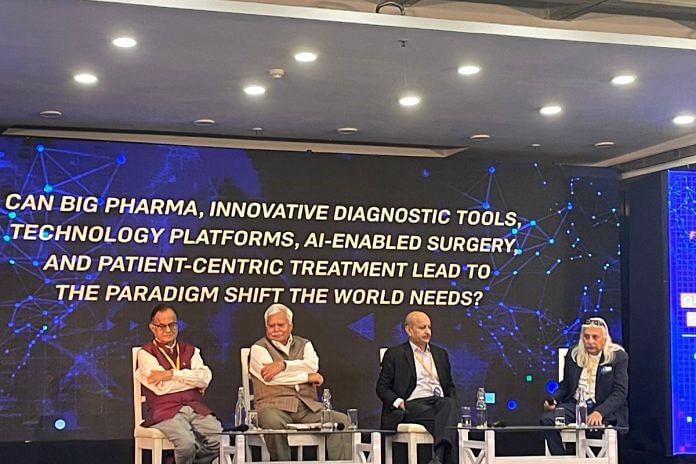Anand Kiran’s Bengaluru-Delhi flight was riddled with anxiety. While he was excited to attend the ‘Be Inspired: Festival of Ideas’ event at the India International Centre on 15 April, having to leave his ailing, octogenarian father behind disturbed him. The executive vice-president of global operations at Indegene, a life sciences company, used this personal anecdote to assess what a similar scenario could look like 30 years from now. Would technology have transformed health and communication, or would he experience the same stress again?
“My father has been a diabetic for 40 years. And I can already see the immense impact of technology on his life. Patches that assess his sugar levels, along with other tools, help us navigate his health,” Kiran said. He saw his father go through four emergency room visits at the height of the Covid-19 pandemic, but even then, he could witness India’s move toward “a great degree of interoperability.”
Interoperability—the ability of different devices, systems and applications to work together—is critical to predicting and managing diseases. But Kiran said that this “digital transformation” should be used responsibly.
“Giving our lives to automation or robots is not ideal, and I find it quite unlikely. [But] I think humans and AI will come together in meaningful ways,” he said during the seminar titled ‘Paradigm Shift in Healthcare, the Shape of Things to Come’.
Also read: ISRO wants to send civilian scientists, doctors to space to research microgravity
Health and tech: a complicated relationship
Artificial Intelligence, technology and healthcare were the focus of many sessions at the day-long event organised by Teamwork Arts.
Conversations around shifts in India’s approach toward healthcare were peppered with insights on the importance of technology. However, its evolution in the healthcare sector over the years – and its future in India – emerged as the hot topic of discussion among the many scientists and government officials attending the event.
Researchers and policy workers assessed, evaluated and presented their understanding of technology’s role in revamping India’s health sector. The success of the government’s CoWIN portal and the potential of Unified Health Interface (UHI), quantum technologies and Metaverse tech were dissected in multiple seminars.
RS Sharma, former CEO of the National Health Authority, explained how initiatives like CoWIN and UHI allowed India to take forward strides.
“Changing legacy systems is very difficult. But these apps and platforms have allowed for technology to create a more inclusive and accessible space,” he said at the ‘Paradigm Shift in Healthcare, the Shape of Things to Come’ session.
Most panellists advised against complete reliance on technology. And they didn’t foresee this possibility either. Monstrous innovations can only be successful when aided by such thinkers and doers.
“Technology is just an enabler. It can do many things, but it can’t do it all,” said Sharma.
A reference to Shah Rukh Khan’s Pathaan invited some smiles from the audience as moderator Sanjoy Roy, managing director at Teamwork Arts, led the discussion to talk about whether there is a “bad guy” who might misuse technology in healthcare.
“How can one innovate but also allow for principles to let technology be used for the greater good?” Roy asked.
A quantum frontier
Digital progress may look rosy, but data privacy is always at stake, warned Ajay Kumar Sood, principal scientific advisor to the central government. And to revolutionise digitisation, he emphasised the importance of quantum technologies.
“Similar to the crossroads of the digital revolution in the 1990s, there is another one on the horizon,” he said.
This month, India is launching the National Quantum Mission, a crucial push in domestic scientific technology. Quantum computing, quantum communication, quantum sensors and metrology, and quantum materials and devices will be the forerunners of a major change in Indian science.
“It’s important to not be complacent with the digitisation we have achieved so far. There is still a lot left to explore,” said Sood.
A similar trail of thought prevailed in the session titled ‘Vaccines for the Future’.
“India’s strength is in how its technology aids diagnosis, for example, genomic sequencing. At this point, we can diagnose anything with great speed,” said K VijayRaghavan, former principal scientific advisor to the central government and DAE-Homi Bhabha chair professor at the National Centre for Biological Sciences at the Tata Institute of Fundamental Research (TIFR).
Technology and digital innovation can only do so much. For the public to reap those benefits, good governance is key.
“Science, technology and governance should work together. Vaccine interventions and drug interventions are very different from building a spacecraft or a railroad. The health space is different because you are dealing with millions of years of evolution,” he adds.
CK Mishra, former Union health secretary, has seen the ministry’s inner workings. But to him, while governance in the form of support and ease of regulations is necessary, there should be other hands stirring the pot. The government, or even the AI, can’t do it all.
“Other manufacturing and research capacities in the country should keep cropping up, and those should be backed by the government,” he said.
This symbiotic relationship is the key to manufacturing vaccines in India and overall development in the country’s health sector. Technology might do the job to an extent, but creating inclusivity, availability and bringing out new innovations will keep it in business. Mishra couldn’t agree more.
“Health is not the business of the government alone.”
(Edited by Zoya Bhatti)



